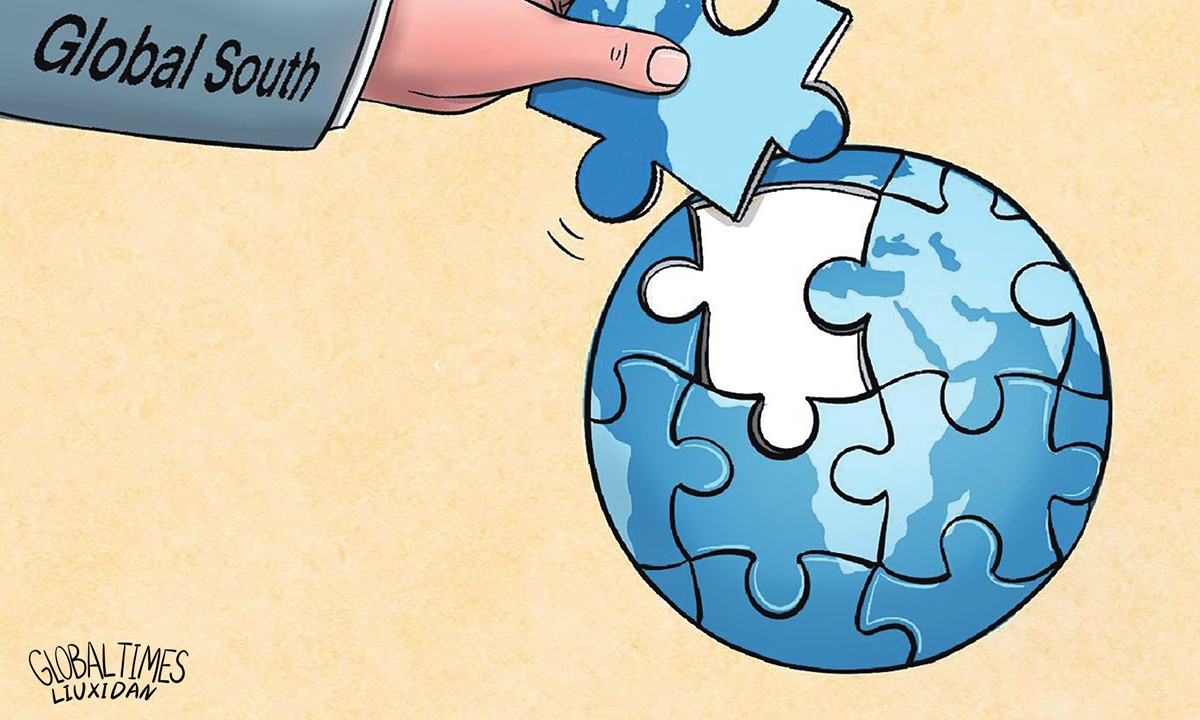GT Voice: G20’s push to eradicate hunger, end poverty requires joint effort

(Illustration: Liu Xidan/GT)
Leaders of the G20 group of largest economies are scheduled to gather in Rio de Janeiro on Monday and Tuesday for the G20 Summit under the Brazilian presidency. A key item on the agenda is the Global Alliance Against Hunger and Poverty.
The G20 alliance against hunger not only promotes South-South cooperation, but also strengthens solidarity and partnership among developing countries in overcoming difficulties and achieving sustainable development. This will drive the transformation of the global agrifood system. That underscores the collective effort of the countries of the Global South to make the global development system fairer and more equitable.
The world is still facing severe problems of poverty and hunger. In the Poverty, Prosperity, and Planet Report issued in October, the World Bank pointed out that poverty has risen for the first time in decades, and the global goal of cutting the extreme-poverty rate to 3 percent by 2030 had slipped out of reach. At the current pace, it will not be met for three decades.
On World Food Day, Deputy Director-General of the UN's Food and Agriculture Organization Beth Bechdol said in an interview that 733 million people worldwide faced hunger in 2023, which is equal to one in 11 globally and one in five in Africa.
This situation not only deprives individuals of their basic rights but also undermines the overall strength and competitiveness of nations, further exacerbating disparities in global development. Therefore, poverty alleviation is not just an issue faced by a single country or region, but a global shared responsibility that requires the cooperation and joint efforts of countries around the world.
In this context, the launch of the Global Alliance Against Hunger and Poverty represents a courageous and commendable response to this pressing global challenge.
China's achievements in combating hunger and reducing poverty are widely recognized. Over the past few decades, the country has lifted hundreds of millions of people out of poverty, establishing itself as a model for global poverty alleviation efforts. This success is closely linked to the comprehensive policies implemented by the Chinese government in areas such as policy-making, funding, and technology. China's experience in poverty reduction is not only relevant domestically but also offers valuable lessons for other developing countries.
Moreover, in recent years, China has made significant strides in global efforts to enhance agricultural cooperation, providing robust support for the fight against food insecurity. Through a combination of policy guidance, financial assistance, and technological collaboration, China actively fosters global agricultural development, making contributions to poverty alleviation.
For instance, cooperation between China and African countries in agriculture has yielded impressive results. China has established 24 agricultural technology demonstration centers across Africa, promoting more than 300 advanced and practical technologies, including corn cultivation, vegetable farming, and cassava propagation. This has led to an increase in local crop yields by 30 to 60 percent.
In particular, as one of the important achievements of China-Africa agricultural cooperation, the application of China's hybrid rice technology has greatly improved the grain self-sufficiency of African countries. Take Madagascar as an example. The planting area of hybrid rice in the country has exceeded 75,000 hectares, with an average yield of 7.5 tons per hectare, more than three times the output of local crop varieties.
Furthermore, the Belt and Road Initiative has presented extensive opportunities for deepening global agricultural cooperation. Through this initiative, China has strengthened policy communication, financial support, and technological cooperation with countries participating in the initiative, collectively advancing the development and modernization of the agricultural sector.
By providing advanced agricultural technology and equipment, China has helped these nations boost their agricultural production capacity and enhance the processing of agricultural products. Additionally, China has actively participated in trade and investment cooperation in agricultural products with these countries, promoting the prosperity of agricultural markets and improving the efficiency of agricultural supply chains.
Of course, addressing the complex challenges of global hunger and poverty is not a task that can be accomplished overnight. It requires the collaborative efforts and sustained investments of nations across the globe. To effectively combat these pressing issues, countries must prioritize strengthening policy communication, enhancing financial support, and fostering technological cooperation, thereby creating a unified front in the fight against hunger and poverty.
Additionally, it is increasingly important for nations to bolster their food security assurance systems, improve food production capacities, and increase reserve levels.
Photos
Related Stories
- China ready to build just world of common development with all parties: spokesperson
- With Rio as a new start, the unchanging original aspiration is multilateralism: Global Times editorial
- China ready to practice true multilateralism with other G20 members: spokesperson
- G20's focus on development highlights the contributions of the 'Global South': Global Times editorial
- Xi calls for a fair, equitable global governance system, warns against protectionism at G20 summit
Copyright © 2024 People's Daily Online. All Rights Reserved.









